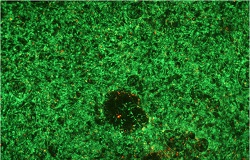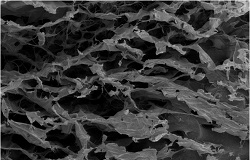Tissue regeneration
The research group Tissue regeneration has extensive experience in the isolation and two- and three-dimensional cultivation of human primary cell cultures obtained from different tissues:
- Bone and cartilage cell cultures isolated from femoral heads or hyaline articular cartilage
- Fibroblast cell cultures isolated from skin samples
- Monocytes and macrophages isolated from buffy coats or whole blood.
In addition to in vitro biocompatibility studies of biomaterials and implant materials (e.g. tricalcium phosphate, collagen, tantalum, titanium) with the various cell types (bone cells, cartilage cells, fibroblasts), experimental animal analyses are also carried out in collaboration with the working group Experimental biomechanics. In order to record the oxygen supply of cells in 3D structures and the metabolic activity, established static and dynamic in vitro cell culture systems with microsensor technology (oxygen and pH value) exist. It is also possible to cultivate two- and three-dimensional cell cultures under specific oxygen conditions (e.g. 5 % ambient oxygen) in order to achieve physiologically approximated experimental conditions.
An important research focus is the possibility of biophysical stimulation of bone and cartilage cells to promote regeneration of specific tissues. In this context, various test systems have been developed to stimulate cell cultures electrically (directly vs. capacitively coupled electric fields) or mechanically (e.g. via micro-movements).
The working group uses hydrostatic high pressure technology (HHD) to devitalize bone, cartilage and fascia for use as tissue replacement material. Beside the extensive characterization of devitalization efficiency, studies on revitalization and cell differentiation as well as on the immunological potential of the treated tissues are carried out.
Furthermore, the biological response to abrasion particles (metallic particles, bone cement particles, polyethylene particles, ceramic particles) and corrosion products is investigated. In this context, extensive knowledge exists on the characterization of bone remodeling processes and the release of inflammation mediators in the corresponding cell cultures. In addition to single cell experiments, the biological response is also investigated in direct and indirect co-cultures.



![[Translate to English:] Europäische Fonds](/fileadmin/_processed_/5/a/csm_Fonds_Logo_quer_f6fa159b5a.jpg)
![[Translate to English:] ESF](/fileadmin/_processed_/d/1/csm_ESF_Logo_f_Zusatz_unten_04dd50d4f3.jpg)

